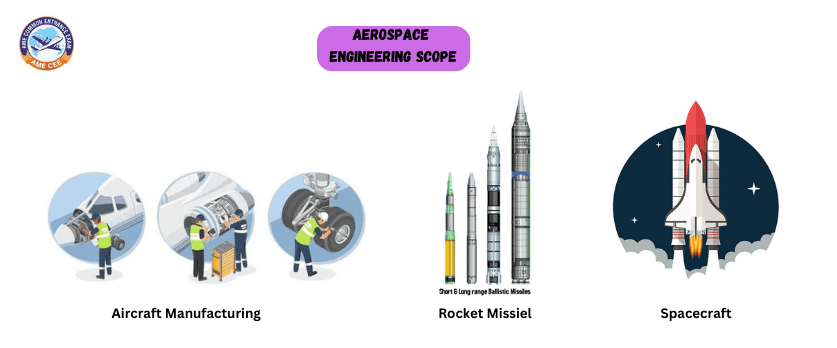Aerospace engineering is a multidisciplinary field that encompasses the design, development, testing, and production of aircraft, spacecraft, satellites, and missiles. The scope of aerospace engineering is extensive, offering a spectrum of opportunities in various sectors. Let’s delve into the diverse dimensions that define the scope of aerospace engineering:
Aircraft Design and Development
Aerospace engineers contribute to the creation of advanced aircraft, ensuring they meet safety, performance, and efficiency standards. This involves aerodynamics, propulsion, and structural design.
Spacecraft and Satellite Systems
The scope extends to the design and development of spacecraft and satellite systems, involving propulsion systems, navigation, communication, and payload integration for space exploration and communication.
Research and Development
Aerospace engineers engage in cutting-edge research to push the boundaries of technology, exploring innovations in materials, propulsion, avionics, and other critical areas.
Manufacturing and Production
The field involves overseeing the manufacturing process, ensuring quality control in the production of aerospace components and systems.
Testing and Simulation
Aerospace engineers conduct rigorous testing, utilizing simulations and real-world trials to assess the performance, reliability, and safety of aircraft, spacecraft, and related systems.
Avionics and Electronics Integration
Avionics engineers focus on integrating advanced electronic systems into aerospace vehicles, including navigation, communication, and control systems.
Propulsion Systems
A significant aspect of aerospace engineering involves the design and improvement of propulsion systems, exploring advancements in engines, fuel efficiency, and alternative propulsion technologies.
Structural Analysis and Design
Aerospace engineers work on the structural design and analysis of aircraft and spacecraft components, ensuring they can withstand the demands of flight and space travel.
Materials Science
The field encompasses advancements in materials science to develop lightweight yet durable materials for use in aerospace structures, contributing to fuel efficiency and overall performance.
Global Navigation and Communication
Aerospace engineers contribute to global connectivity by developing systems that facilitate navigation and communication for aircraft, satellites, and space missions.
Environmental Considerations
The scope extends to addressing environmental concerns, with a focus on developing eco-friendly aircraft, satellite deployment practices, and sustainable aerospace technologies.
Entrepreneurship and Innovation
The evolving aerospace industry offers opportunities for entrepreneurial ventures and innovative solutions, allowing aerospace engineers to contribute to industry advancements.
International Collaboration
Aerospace engineers often collaborate internationally, working with experts from different countries to address global challenges and foster advancements in aerospace technology.
Defence and Security
Aerospace engineers may find opportunities in the defense sector, contributing to the development of military aircraft, missile systems, and related technologies.
Autonomous Systems
The future of aerospace engineering includes the development and integration of autonomous systems in aircraft and spacecraft, requiring expertise in artificial intelligence and robotics.
Frequently Asked Questions (FAQs) on Aerospace Engineering Scope
Q1. What is the scope of aerospace engineering?
A. Aerospace engineering involves the design, development, and production of aircraft, spacecraft, satellites, and missiles. The scope extends to various aspects, including aircraft design, space exploration, research, and technological innovation.
Q2. What career opportunities are available in aerospace engineering?
A. Aerospace engineers can pursue careers in aircraft and spacecraft design, research and development, manufacturing, testing, avionics, propulsion systems, and space exploration. Opportunities also exist in defense and security industries.
Q3. How does aerospace engineering contribute to space exploration?
A. Aerospace engineers play a vital role in designing and developing spacecraft, propulsion systems, and satellite technology, contributing to space exploration missions conducted by government agencies and private space companies.
Q4. What specializations are available within aerospace engineering?
A. Aerospace engineering offers specializations such as aerodynamics, avionics, propulsion, materials science, structural analysis, and space systems. Engineers can choose to specialize based on their interests and career goals.
Q5. How does aerospace engineering address environmental concerns?
A. Aerospace engineers work towards developing environmentally friendly technologies, including fuel-efficient aircraft and sustainable aerospace practices, to minimize the environmental impact of air and space travel.
Q6. What role do aerospace engineers play in global connectivity?
A. Aerospace engineers contribute to global connectivity by designing navigation and communication systems for aircraft and satellites, facilitating efficient and secure communication across the globe.
Q7. Is entrepreneurship possible in the field of aerospace engineering?
A. Yes, the aerospace industry provides opportunities for entrepreneurship, allowing engineers to establish their ventures, innovate new technologies, and contribute to the growth and evolution of the aerospace sector.
Q8. How does aerospace engineering embrace technological advancements?
A. Aerospace engineering is at the forefront of technological innovation, incorporating advancements in materials, electronics, artificial intelligence, and robotics to enhance the performance, safety, and efficiency of aerospace vehicles.
Q9. Can aerospace engineers work in the defense sector?
A. Yes, aerospace engineers often find opportunities in the defense and security industries, contributing to the development of military aircraft, missile systems, and other defense technologies.
Q10. What is the future outlook for aerospace engineering?
A. The future of aerospace engineering is promising, with ongoing advancements in autonomous systems, space exploration, and sustainable aviation. Engineers can anticipate exciting challenges and opportunities as the industry continues to evolve.
In conclusion, aerospace engineering offers a diverse and dynamic scope, presenting numerous career paths and opportunities for those intrigued by the vast possibilities of air and space exploration.
To become an aerospace engineer you may could join aerospace engineering through AME COMMON ENTRANCE EXAM (AME CEE) this examination you may join Aerospace Engineering approved by AICTE.


